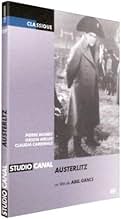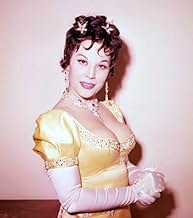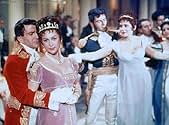IMDb RATING
6.2/10
1.1K
YOUR RATING
Another of Napoleon's adventures in this epic reconstruction of the battle of Austerlitz, where he had the greatest victory of his career, over the Russians.Another of Napoleon's adventures in this epic reconstruction of the battle of Austerlitz, where he had the greatest victory of his career, over the Russians.Another of Napoleon's adventures in this epic reconstruction of the battle of Austerlitz, where he had the greatest victory of his career, over the Russians.
- Director
- Writers
- Stars
- Awards
- 1 nomination total
- Director
- Writers
- All cast & crew
- Production, box office & more at IMDbPro
Featured reviews
I believe the reason after so many votes that no one has decided to offer a review of this film is because it appears so hard to define it as a film. This is much more a tedious, detailed account of Napoleon's victory at the battle of Austerlitz. The film focuses so much on the strategic underpinnings of the battle that is almost seems more like watching a risk or stratego game than a film. From the political maneuvering of how the French and Russian forces came to the battle to the strategic genius that was Napoleon this film does not offer much in the way of character development, acting, or even special effects. What the film does offer is a historical recount of how battles were fought in the early 19th century. The only interesting cinematic points of interest is to look for a young Jack Palance as a Russian General and a scene stealing Orson Welles as an American inventor. Also this was one of the last films directed by the French "DW Griffith" - Abel Gance.
Abel Gance's unabashed adoration of Napoléon Bonaparte bore fruit in one of the undisputed masterpieces of silent cinema. Thirty-four years later he again depicts his hero in a film that is totally devoid of the flair and dazzling inventiveness of the earlier work. He is assisted by Roger Richebé who had directed Gance's original Napoléon, Albert Dieudonné, in that actor's second outing in the role in 'Madame sans-gene.' Here he is played by Pierre Mondy.
One is impressed by the art direction, costume design and the beautifully shot series of tableaux vivants by Messieurs Alekan and Juillard but alas the whole enterprise is verbose, bombastic, self-indulgent and uninspired and fails to justify its lumbering two and three-quarter hour length.
Most of the males are marionettes with the notable exceptions of Welles, Marais, Trintignant and Marchal whilst grizzled Michel Simon does an outrageous turn as one of Napoléon's Old Guard. Plenty of cleavage on display and an enchanting cameo by Leslie Caron as one of Bony's extra-marital activities. The most ludicrous piece of casting is that of Jack Palance as an Austrian General. As Pope Pius V11 an utterly expressionless Vittorio de Sica calls Bonaparte ' a comedian' which pretty well sums up Pierre Mondy's portrayal.
Regarding Monsieur Gance's output I think it fair to say that 'silence is golden.'
One is impressed by the art direction, costume design and the beautifully shot series of tableaux vivants by Messieurs Alekan and Juillard but alas the whole enterprise is verbose, bombastic, self-indulgent and uninspired and fails to justify its lumbering two and three-quarter hour length.
Most of the males are marionettes with the notable exceptions of Welles, Marais, Trintignant and Marchal whilst grizzled Michel Simon does an outrageous turn as one of Napoléon's Old Guard. Plenty of cleavage on display and an enchanting cameo by Leslie Caron as one of Bony's extra-marital activities. The most ludicrous piece of casting is that of Jack Palance as an Austrian General. As Pope Pius V11 an utterly expressionless Vittorio de Sica calls Bonaparte ' a comedian' which pretty well sums up Pierre Mondy's portrayal.
Regarding Monsieur Gance's output I think it fair to say that 'silence is golden.'
...and to "Napoleon" whose life Gance transferred to the screen in the silent era.Sandwiched between two very underrated Gance works ("la Tour de Nesles" and "Cyrano et D'Artagnan" )it is a return to "real " "true" history.I will go as far as to write that Gance impressed me much more when his movies dealt with fictionalized history (the two mentioned movies,but "j'accuse" too)."Austerlitz has something academic ,conventional.It has nothing of Gance's madness.The first part is a stream of stars from Martine Carol to Claudia Cardinale ,from Jean Marais to Orson Welles (in a part which reminds us how Gance was interested in the development of science through the centuries ,à la Jules Verne,we find this interest in "Cyrano" and "J'accuse" too).THe lead is a good actor but he might be ,on an international level, the least known of them all:Pierre Mondy's name is buried in the cast and credits and although he is on the screen from the beginning to the end,his name is not bigger than that of Welles who appears barely five minutes.Ah fame! The first part has only one sequence where we find back the inventive Gance:we do not attend the coronation in Notre Dame ;the marechal de Ségur (Jean-Louis Trintignant) tells the whole story with the model in front of a strange audience:servants ;then the "mamma " ("pourvu que ça dure!=lets hope it lasts!") ,Napoleon's mother (Elvire Popesco) enters and her tears begin to flow .Although David put her in his famous painting she did not attend the ceremony.
The second part is more historically interesting ,but if you are not fond of military strategy ,you may stop yourself yawning.Fortunately a soldier of the old guard of Napoléon (un "grognard" )played by Michel Simon brings a bit of life among these troop movements.
Last but not least:I have always asked myself why a convinced pacifist such as Gance (his two versions of "j'accuse" may be the strongest anti-war films ever)could be so fascinated by a warrior such as Napoleon.
The second part is more historically interesting ,but if you are not fond of military strategy ,you may stop yourself yawning.Fortunately a soldier of the old guard of Napoléon (un "grognard" )played by Michel Simon brings a bit of life among these troop movements.
Last but not least:I have always asked myself why a convinced pacifist such as Gance (his two versions of "j'accuse" may be the strongest anti-war films ever)could be so fascinated by a warrior such as Napoleon.
I was under the impression for ages that Abel Gance only made one Napoleon film (all the way back in 1927), and that he wanted to make five or six, but never got the chance. It turns out this isn't entirely true. Not only is Napoleon (1927) long enough to be two or three films in one (it's like 5.5 hours long), but Gance got to make a sort-of sequel in 1960, with the also epic-length The Battle of Austerlitz.
This 1960 film is about half the length of Napoleon, but that still puts it at approximately 170 minutes. It also feels like two movies in one, with a lot of political drama being the focus of the first half, and then the second half centering on planning for the titular battle alongside showing some of it.
I thought the second half would be a good deal more engaging, but I think The Battle of Austerlitz starts quite well, staying pretty engaging for maybe the first half of its first half. Things don't necessarily pick up in a big way once the second half starts, though. It's a bit plodding in different ways to the first half, and it becomes apparent at a point that even the battle parts aren't really going to be about depicting exciting battles. If you come in hoping for something similar to the 1966/67 War and Peace or Waterloo, you'll probably come away disappointed.
The methodical approach to it all (across both halves), while dry, is somewhat admirable. Abel Gance isn't doing nearly as many adventurous things with the camera this time around, which can be disappointing after having watched his 1927 film, but I guess there's sound now, and it's a new approach. The transition from making a silent Napoleon film to making a more traditional one with dialogue was more seamless than I'd been anticipating, and Gance would've had to have been fairly old while making this. I think he did a decent job, all things considered.
Still, this is probably just a curiosity piece for those who were intrigued by and liked Napoleon, or just anyone who's interested in any film about Napoleon Bonaparte. There sure are many of them; I keep coming across new ones all the time, and honestly, I don't think I've seen any I could call flat-out bad yet.
This 1960 film is about half the length of Napoleon, but that still puts it at approximately 170 minutes. It also feels like two movies in one, with a lot of political drama being the focus of the first half, and then the second half centering on planning for the titular battle alongside showing some of it.
I thought the second half would be a good deal more engaging, but I think The Battle of Austerlitz starts quite well, staying pretty engaging for maybe the first half of its first half. Things don't necessarily pick up in a big way once the second half starts, though. It's a bit plodding in different ways to the first half, and it becomes apparent at a point that even the battle parts aren't really going to be about depicting exciting battles. If you come in hoping for something similar to the 1966/67 War and Peace or Waterloo, you'll probably come away disappointed.
The methodical approach to it all (across both halves), while dry, is somewhat admirable. Abel Gance isn't doing nearly as many adventurous things with the camera this time around, which can be disappointing after having watched his 1927 film, but I guess there's sound now, and it's a new approach. The transition from making a silent Napoleon film to making a more traditional one with dialogue was more seamless than I'd been anticipating, and Gance would've had to have been fairly old while making this. I think he did a decent job, all things considered.
Still, this is probably just a curiosity piece for those who were intrigued by and liked Napoleon, or just anyone who's interested in any film about Napoleon Bonaparte. There sure are many of them; I keep coming across new ones all the time, and honestly, I don't think I've seen any I could call flat-out bad yet.
My review of this film can be summed up in five words a brilliant work of art.As described in the previous description the film itself is long and sometimes tedious.What it fails to mention is that it was created by the same Director that brought us the Silent film about Napoleon Abel Gance.The film is in colour and is very faithful to the feel of Napoleon and the time he ruled Europe.It is primarily about the greatest victory Napoleon achieved in his career,however it also touches on many of the events in his life leading up to that moment including his coronation as Emperor of France.If you are a student of Napoleon or French history or this time period you will enjoy this picture.Shot all throughout Europe in the fifties in many languages it remains in my opinion as the greatest picture chronicling Napoleon and his life.The film not only tells a story from his perspective but many others as well.It is difficult to find and even more expensive to own but I definitely recommend you see it at least once for yourself.
Did you know
- TriviaIn the 1920s Abel Gance had written a six-part movie biography of Napoleon. He shot the first part (Napoleon (1927)), which turned out to be a financial disaster. He sold the sixth part to Lupu Pick, who shot Napoleon auf St. Helena (1929). Wanting to make a comeback at the end of the 1950s, Gance rewrote the third part to make it "Austerlitz".
- GoofsIn the scene in William Pitt's office in London which is set in the early 1800's, you can see in the background through the window the Houses of Parliament and Big Ben, 60 years before they were built.
- Alternate versionsThe original French version runs longer than the English dubbed international one. It contains extra scenes including ones with Napoleon visiting his mistress and of Ségur (Jean-Louis Trintignant) imagining the coronation of the emperor for the palace staff.
- ConnectionsEdited into Histoire(s) du cinéma: Seul le cinéma (1994)
- How long is The Battle of Austerlitz?Powered by Alexa
Details
- Release date
- Countries of origin
- Language
- Also known as
- Austerlitz - Glanz einer Kaiserkrone
- Filming locations
- Production companies
- See more company credits at IMDbPro
Box office
- Budget
- $4,000,000 (estimated)
- Runtime
- 2h 2m(122 min)
- Sound mix
- Aspect ratio
- 2.35 : 1
Contribute to this page
Suggest an edit or add missing content









































